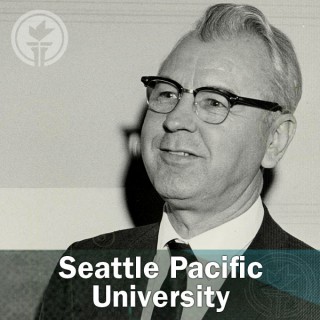Podcast appearances and mentions of Paul T Walls
- 3PODCASTS
- 26EPISODES
- 55mAVG DURATION
- ?INFREQUENT EPISODES
- Nov 17, 2016LATEST
POPULARITY
Best podcasts about Paul T Walls
Latest podcast episodes about Paul T Walls
2016/05/03. gather. Paul T. Walls Professor of Scripture and Wesleyan Studies.
2016/05/03. gather. Paul T. Walls Professor of Scripture and Wesleyan Studies.
I Knew When Written on My Heart: Experience and the Knowledge of God
2015/05/06. Paul T. Walls Lecture. Associate Professor of Theology.
I Knew When Written on My Heart: Experience and the Knowledge of God
2015/05/06. Paul T. Walls Lecture. Associate Professor of Theology.
2014/04/08. gather. Paul T. Walls Professor of Scripture and Wesleyan Studies.
2014/04/08. gather. Paul T. Walls Professor of Scripture and Wesleyan Studies.
2012/05/02. Focuses on Romans 7:14-25: "This passage has long been a storm center of Protestant interpretation, especially as it relates to the gospel of justification by faith alone. Does this passage realistically describe the spiritual frustration of the believer who knows what God wants but is unable to obey God? Or does the argument of Romans require a different identity of the 'I' character of Chapter 7, more in line with Wesley's 'scripture way of salvation?'" Paul T. Walls Lecture.
Empire, Church, Missio Dei: On Praying for Our Kings: 1 Timothy 2:1–2
2011/04/07. Addresses how Paul instructed the church to engage governing authorities. Paul T. Walls Lecture.
John's John: The Tenor of Scripture in a Wesleyan Key, Part Three
2010/04/08. Walls Lecture in Wesleyan Theology. Paul T. Walls Professor of Scripture and Wesleyan Theology.
John's John: The Tenor of Scripture in a Wesleyan Key, Part Three
2010/04/08. Walls Lecture in Wesleyan Theology. Paul T. Walls Professor of Scripture and Wesleyan Theology.
John's John: The Tenor of Scripture in a Wesleyan Key, Part Two
2009/04/10. Continues to explore John Wesley's theological appropriation of 1 John. The Paul T. Walls Lecture. Paul T. Walls Professor of Scripture and Wesleyan Studies.
John's John: The Tenor of Scripture in a Wesleyan Key, Part Two
2009/04/10. Continues to explore John Wesley's theological appropriation of 1 John. The Paul T. Walls Lecture. Paul T. Walls Professor of Scripture and Wesleyan Studies.
John's John: The Tenor of Scripture in a Wesleyan Key
2010/04/08. Walls Lecture in Wesleyan Theology. Paul T. Walls Professor of Scripture and Wesleyan Theology.
Crisis and Strategy: The Apostle Paul as Task Theologian
1992/10/27. Describes Paul's theology as stemming from missions, relational interactions, and the conflict between culture and the Gospel. Professor of Theology. Paul T. Walls Lecture.
Medicine and Ministry: A Theology of Wholeness (Original Title Unavailable)
2000/10/19. A theology of wholeness, envisioning a full picture of human existence from the spiritual to the psychological to the biological. Paul T. Walls Professor of Theology.
Formation and Reflection: The Dynamics of Theology In Christian Life
2001/10/25. Presents a view of theology he believes is a more authentic understanding embodied in the early church and shares how that view is rooted in Wesleyan theology and how it helps us to understand our history and future. The Paul T. Walls Lecture.
Ride the Wooden Horse: Wesleyan Advice for the Day
1998/11/05. Engages Wesley's answer to the question of 'how' when one decides to follow Christ in one's life, especially in a life where commitments fade. Paul T. Walls Professor of Theology. The Paul T. Walls Lecture.
Left Behind? or Right Ahead! A Wesleyan Perspective On Eschatology and the Difference it Makes
2002/10/10. Looks at the "Left Behind" series as a part of a larger conversation on the end times. The Paul T. Walls Lecture.
Formation and Reflection: The Dynamics of Theology In Christian Life
2001/10/25. Presents a view of theology he believes is a more authentic understanding embodied in the early church and shares how that view is rooted in Wesleyan theology and how it helps us to understand our history and future. The Paul T. Walls Lecture.
Left Behind? or Right Ahead! A Wesleyan Perspective On Eschatology and the Difference it Makes
2002/10/10. Looks at the "Left Behind" series as a part of a larger conversation on the end times. The Paul T. Walls Lecture.
2003/10/16. Appreciating John Wesley's spiritual growth through his years of ministry and gleaning lessons from his life. Professor of Scripture and Wesleyan Theology. The Paul T. Walls Lecture.
2004/11/04. Reflects on the passion of Christ as it appears in Mel Gibson's film "The Passion of the Christ" and the book "The Glorious Appearing" in the light of some central Wesleyan convictions about Christ's saving work. The Paul T. Walls Lecture.
2004/11/04. Reflects on the passion of Christ as it appears in Mel Gibson's film "The Passion of the Christ" and the book "The Glorious Appearing" in the light of some central Wesleyan convictions about Christ's saving work. The Paul T. Walls Lecture.
How Free is "Free" Methodism: The Importance of SPU's Religious Legacy
2007/03/08. Examines the Wesleyan tradition. The Paul T. Walls Lecture.
How Free is "Free" Methodism: The Importance of SPU's Religious Legacy
2007/03/08. Examines the Wesleyan tradition. The Paul T. Walls Lecture.
2003/10/16. Appreciating John Wesley's spiritual growth through his years of ministry and gleaning lessons from his life. Professor of Scripture and Wesleyan Theology. The Paul T. Walls Lecture.






